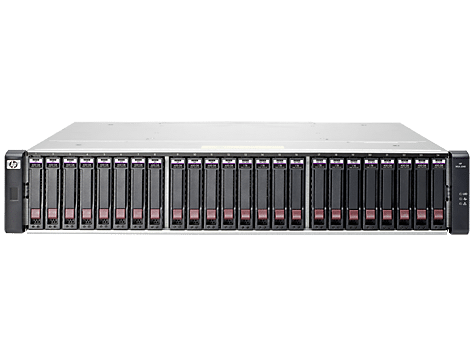
HP today announced fortchoming updates to its MSA Storage solution that leverages SSDs to add data tiering. and other virtualization functionality to the company's entry-level Fibre Channel arrays. HP's updates place a priority on using the fourth-generation MSA architecture to make technologies including sub-LUN tiering, thin provisioning, and intelligent storage automation more accessible to budget-constrained IT departments.
The new MSA automated data tiering capabilities are oriented around two use cases: Archive Tiering and Performance Tiering. Archive Tiering will be made available at no cost to current MSA 2040 owners and can automatically move data that has not been recently accessed from high-performance SAS drives to more affordable midline SAS drives. According to HP’s benchmarks, Archive Tiering can lower cost per gigabyte by 75% when deployed to an array with both Enterprise SAS (10k/15k) drives and Midline SAS (7.2k) drives.
Performance Tiering is an add-on feature for HP MSA 2040 Storage arrays that accelerates workloads by moving frequently accessed “hot” data onto SSDs. A new SSD Read Cache feature for the MSA 2040 leverages a predictive algorithm to accelerate read-intensive workloads such as Microsoft SQL, Microsoft Exchange, CRM, Oracle Database, and SAP. According to HP, SSD Read Cache acceleration improves performance by up to 70 percent using one 200GB SSD as a Read Cache with a with a 2TB 15K SAS HDD volume during a benchmark that uses combination of workloads made up of 60 percent read/40 percent write operations and 90 percent read/10 percent write operations. HP supports modern SSDs with this update that have capacities up to 1.6TB.
Intelligent storage automation and advanced storage capabilities have been added to both the MSA 1040 and 2040 Storage arrays, including simplified volume expansion and rebalancing, thin provisioning, and automated capacity reclamation. New volume expansion and rebalancing functionality streamlines volume layout and redistribution tasks, while thin provisioning lowers up-front storage costs and enables “thin rebuilds” to accelerate RAID reconstruction by only rebuilding storage blocks used to store data. The new capacity reclamation functionality works with thin-aware host operating systems such as Linux and Windows, along with hypervisors from VMware and Microsoft, in order to improve storage efficiency by reclaiming deleted file space without administrator intervention.
HP’s MSA arrays will also receive a new web GUI as a part of these updates. The new interface is particularly intended to make the MSA easier to administrate in virtualized environments where virtual machine proliferation can make management more complex than in other SMB MSA deployment scenarios.
Pricing and availability
The updated MSA 1040 and 2040 firmware is now in controlled release and is expected to be generally available in December 2014. MSA 1040 customers can upgrade their firmware and purchase the MSA 1040 Advanced Virtualization Upgrade for $3,500. MSA 2040 customers can take advantage of all new features except Performance Tiering via a free firmware upgrade. Performance Tiering is only available on the MSA 2040 and is priced at $3,999.

